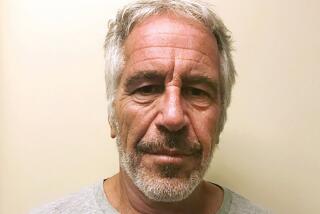Shouldering the Load, and the Rifle
This year it’s Haiti. Last year it was Liberia. Before that it was Sierra Leone, Congo, Rwanda and Somalia. The world is full of failed states where life is nasty, brutish and short. Powerful nations know they cannot ignore these areas, not only for moral reasons but also because problems spill over into their own backyards, by way of communicable diseases, refugees and -- worst of all -- terrorists and weapons of mass destruction. But what are they supposed to do about these humanitarian catastrophes?
A hundred years ago the answer was obvious: A “civilized” country would colonize an “uncivilized” one. Today there is little eagerness in the West to take on what Rudyard Kipling called “the white man’s burden.” So, instead of acting decisively, we muddle through, passing high-minded resolutions at the United Nations and occasionally sending a few troops. It is this half-hearted approach that allowed the genocide in Rwanda and Bosnia and lesser horrors from Liberia to Haiti.
Isn’t it about time we got serious about dealing with failed states? If we did, we would have to devise both national and international remedies.
Nationally, the United States needs to create a standing agency devoted to nation-building; it should have a director with the authority to force disparate departments in the U.S. government to work together, something that didn’t happen before the invasion of Iraq. The military too needs to devote more attention to nation-building, perhaps by adopting a proposal from the Pentagon’s Office of Force Transformation to add a couple of divisions specially trained for peacekeeping.
The job of policing the globe is too big for one country, however, and the U.S. needs more help from its allies. Washington should encourage regional powers to assume responsibility for their own backyards -- Australia in Southeast Asia, Nigeria in West Africa, South Africa in southern Africa, and so on. Some of this has already been happening -- for instance, the Australian interventions in East Timor and the Solomon Islands. The U.S. provided support for those missions but no troops -- a good bargain from our standpoint.
There are also international organizations that can assist. NATO is creating a 21,000-strong Response Force. The European Union wants to follow suit. And the Pentagon has discussed setting up an International Peacekeeping Force with contributions from the U.S. and allied nations, though how it would work remains unclear.
Don’t forget the United Nations. It currently deploys more than 45,000 peacekeepers, but their effectiveness is severely limited because they are supposed to enforce existing peace accords and stay strictly neutral even if one party is clearly at fault. This does nothing to help in places like Rwanda and Haiti, where there is no peace to enforce. The idea of creating a more robust U.N. force capable of smiting aggressors has been around since the late 1940s. It got a brief burst of life in the early 1990s after the end of the Cold War, but it was entombed after the U.N. was blamed for failures in Bosnia, Rwanda and Somalia.
It’s time to resurrect the idea of a standing U.N. army, as a supplement, if not replacement, for the other forces mentioned above. The key to making it work would be eschewing the old U.N. way of doing things, which consists of asking for military contributions from a lot of countries with minimal capabilities, no record of working together and differing strategic interests. This produces low-quality blue helmets that are the laughingstock of thugs everywhere.
The U.N. needs a tough, professional force like the French Foreign Legion that would not quail before Haitian gang leaders or Serbian ethnic-cleansers. Members of such an outfit would have to be recruited on merit and trained together; it could not be cobbled together at the last minute from the military riffraff of Third World dictatorships. To make it work, the U.N. Department of Peacekeeping Operations would have to beef up its command, intelligence and logistical capabilities. The U.N. would also need to improve its ability to run failed states in a Kosovo-style receivership.
This proposal may seem like wishful thinking, not only because the U.N. is so slow to change but also because there is so much animus toward that organization in the U.S., which would have to sign off on this new force. If even the “multilateral” Clintonites eschewed this idea, what chance is there that it will be embraced by the “unilateral” Bushies? Not much, perhaps, but then George W. Bush used to oppose nation-building altogether -- until he realized that it was in America’s interest.
Likewise, beefing up peacekeeping capacity is very much in our interest. That would enable us to avoid the dilemma we face today in Haiti: either do nothing and let violence explode or take on a burden -- fixing things ourselves -- that we’re not prepared to shoulder. There has to be a better way. I hope we find it before the next disaster strikes.
More to Read
Start your day right
Sign up for Essential California for news, features and recommendations from the L.A. Times and beyond in your inbox six days a week.
You may occasionally receive promotional content from the Los Angeles Times.





